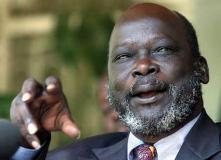Southern Sudan rebel leader accuse government of genocide in Darfur
By ANTHONY MITCHELL, Associated Press Writer
ADDIS ABABA, Ethiopia, Oct 22, 2004 (AP) — The leader of southern Sudanese rebels on Friday accused Sudan’s government of committing a genocide in the country’s western Darfur region, where militias are blamed for killing tens of thousands of people in a bid to quell a 20-month insurgency.
 Southern rebel leader John Garang — who heads a rebellion not tied to the western insurgency — said the Darfur conflict has been particularly vicious because the Sudanese government is using tribal militias to attack communities that support insurgents.
Southern rebel leader John Garang — who heads a rebellion not tied to the western insurgency — said the Darfur conflict has been particularly vicious because the Sudanese government is using tribal militias to attack communities that support insurgents.
“The government mobilizes tribes that support the government against tribes that support the rebels,” Garang told reporters after meeting African Union officials. “So instead of having armies fighting armies, you have people fighting people — and that is a basis for genocide,”
U.S. Secretary of State Colin Powell said in September that a genocide was being committed in Darfur against non-Arab villagers, though no other government has made a similar declaration.
Darfur’s troubles stem from long-standing tensions between nomadic Arab tribes and their African farming neighbors over dwindling water and agricultural land. Those tensions exploded into violence in February 2003 when two African rebel groups took up arms over what they regard as unjust treatment by the government in their struggle with Arab countrymen.
An estimated 70,000 people have died since the conflict broke out, according to U.N. figures, and nearly 1.5 million more have fled to refugee camps. The United Nations has begun investigating possible war crimes in the region.
Sudan denies frequent allegations that it supports the Arab militia, known as the Janjaweed.
Garang’s Sudan People’s Liberation Army and the government are currently working out the final details of peace agreement to end the southern rebels’ 21-year fight for control of southern Sudan.
The southern conflict broke out in 1983 after rebels from the mainly animist and Christian region took up arms against the predominantly Arab and Muslim north. Most of the 2 million casualties have come from war-induced famine.
Although often simplified as a religious war, the conflict is fueled by historical disputes and competition for resources, including major oil reserves.
